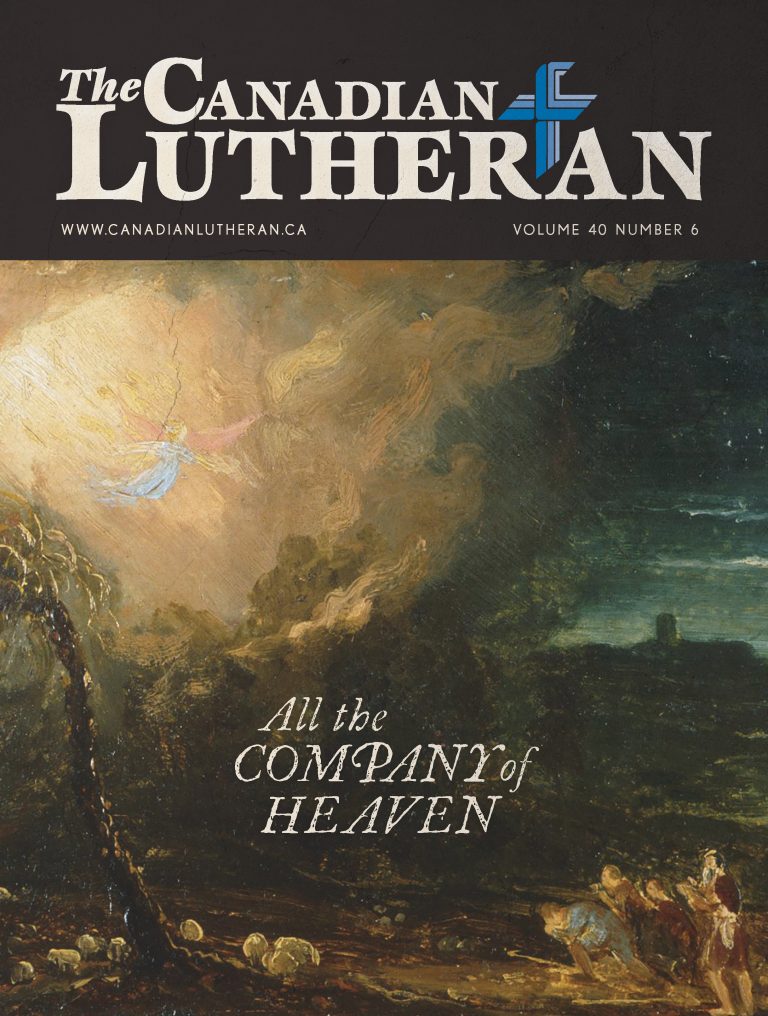The Holidays… How Soon?

by James Morgan
How soon? It’s a question I ask myself every year about how early my friends, family, and I should observe the festive season. In the Church, Christmas begins on December 25 when we celebrate the birth of Christ, and it continues for 12 following days. It has nothing to do with gathering with family and friends, decorating the house, or especially shopping and Santa Claus. Christmas has unfortunately come to be a brand on anything sociable or commercial that takes place from mid-autumn until the malls close on December 24. The real Christmas is what matters, and regardless of if there’s a tree in the living room, lights strung on the front porch, or plastic pine boughs affixed to the doorways, remembering the birth of our Saviour will still happen.
There are few things I forget. I can remember images and words from when I was a small child with amazing clarity. This often surprises and embarrasses friends and loved ones. It’s also both a gift and a liability. Looking back, it never seemed like references to the commercial aspects of Christmas began so early when I was a child, although I can vaguely recall a TV commercial for a now defunct catalogue chain featuring singing elves telling viewers to place their orders on time. My parents sent my sister and me to a Roman Catholic elementary school for over two years, and we were Anglicans at the time. At neither school nor church did Christmas ever get mentioned much during the first 24 days of December, except for the obligatory school and Sunday school concerts. It was all about Advent, that time of preparation, penance, and reflection leading up to the commemoration of Christ’s birth.
The emphasis on Advent gives one a sense of perspective and promise during a season where much of society becomes over-consumed with frenzy leading up to the festival of over-consumption that Christmas has become. Four candles in a wreath, lit over the Sundays preceding Christmas have a way of methodically and reflectively leading one to the even more spectacular big event while ignoring the blast of commercialism.
The emphasis on Advent gives one a sense of perspective and promise during a season where much of society becomes over-consumed with frenzy leading up to the festival of over-consumption that Christmas has become.
The Commercialization of Christmas

Thomas Nast’s 1881 drawing of Santa, an illustration that helped cement the traditional North American image of Santa.
Advent and contemplative spiritual preparation aside, society, including the Christians in it, has an awfully hard time resisting the excitement of the far less religious aspects of the season—perhaps a bit too early and in the most unlikely places. My family life provides many examples of this. I recall two summer vacations in particular. One included visiting the New Hampshire location of Santa’s Village (others exist throughout the U.S.A. and Canada), and another trip found me standing in shorts and a tee-shirt on a hot August day in Michigan outside what is surely the world’s largest store to sell Christmas merchandise. In defense of the store, the management emphasizes CHRISTmas in their advertising; their slogan is “It’s HIS day, it’s HIS way,” and Christmas Day is the only day of the year the store is closed.
My father and my sister were and still are way too excited about decorating and cooking for Christmas, long before my mother or I feel it is necessary. My father, an avid hunter, gets the same look on his face when Christmas shopping that he does when tracking a deer. He would even take a day or two off work to do baking in the past. My sister recently participated in a Christmas bazaar to raise money for a Christian youth organization in her community. That event coincided with several other bazaars for local churches and charities on what could best be called a bazaar weekend.
These early and year-round examples of celebration and commercially-driven excitement tie in with the larger theme of respect. Aside from those who believe Christmas should be kept in its Christian place and time on the calendar, there is the question of respect for those who would rather not have a commercial circus overshadowing their own observances. The most obvious of those requiring respect and consideration are veterans. Many individuals, including business owners, hold to the unwritten rule that pre-Christmas activities and merchandising before or on Remembrance Day is disrespectful and in poor taste.
In my experience, this mindset tends to be most common in smaller communities where people have a much closer connection with their neighbours. In Listowel, Ontario, the town where I grew up, ribbons indicating financial support for the Poppy Fund at the local Royal Canadian Legion branch appear in the windows of local businesses, and almost never are they accompanied by Christmas decorations. Poppy Fund ribbons are basically invisible in the two large cities where I spend most of my time now. Christmas merchandise and decorations were beginning to encroach upon the equally excessive Halloween extravaganza in local stores weeks before trick-or-treaters hit the streets. In Gatineau and Ottawa, being in the shadow of the National War Memorial, the monument that becomes the focal point of the country on Remembrance Day seems to have little deterrence to the commercial world when it comes to decking the halls way too soon.
Santa Claus is already in town
On a recent trip to the United States, I was even more surprised to discover how prevalent early Christmas commercialism and celebration (in a most secular sense) was. A mall in a Detroit suburb was fully decorated. Seasonal music was playing loudly throughout, urging everyone not to shout, pout, or cry (such a silly warning) because Santa Claus was coming to town. By the time I reached the cavernous centre court of the mall, I discovered he indeed had already come to town. There stood a structure called the Ice Palace, which really didn’t contain any ice, but was rather a testament to what a few creative mall employees can do with plywood, spray paint, cotton batting, and plastic fake snow. Children and parents were lined up to visit with the department store derivative of St. Nicholas who sat inside
It was November 6.
A camera stood stationery on a tripod. I saw a parent hand over cash for a photo. What was especially telling about just how secularized so-called Christmas traditions such as Santa at the mall are is that one of the mothers escorting her child out of the Ice Palace after his chat with Mr. Claus was wearing a hijab. The secular celebration of the season is indeed for all; it not only makes money but it is politically correct enough not to offend anyone. I really wasn’t offended by seeing a Muslim mother taking her son to see Santa Claus. An elderly man with an unkempt beard in a furry red suit who only works one day a year is not part of the real Christmas that I believe in as a Christian. Christ, unlike Santa, is real. He’s always working in the lives of those who believe in him. The fulfillment that knowing and feeling Christ’s love brings is far more infinite than whatever the mythical Santa Claus leaves under a tree or the cosy feeling of a warm holiday beverage by the fireside with friends and family.
Returning to the unwritten rule of no Christmas until after Remembrance Day, I discovered this is not only a small town social code, but perhaps only a Canadian one. Many Canadians love to exclaim that our American neighbours are more supportive of their veterans and military personnel than we are. If that were really so, that mall in Dearborn Michigan would not have looked and sounded like a Motown version of Jingle Bell Rock. This became even more apparent to me after returning to my hotel room. I switched on the television and noticed commercials for Veterans Day sales at a couple of Detroit-area furniture store chains. The near sacredness of Remembrance Day/Veterans Day never seemed to me like an occasion to slash the prices of sofas and dining room sets. I suppose in a roundabout way that the justification for such a bizarre sales event could be that men and women have fought hard and sacrificed their lives to preserve the freedom to sell furniture at discount prices. Surely though, freedom has to be worth more than that! Though an unwritten rule and limited in use, deferring the more non-Christian aspects of the Christmas season until after Remembrance Day is a good standard to follow. No small town craft bazaar or store owner would endure the consequences of not abiding by it—at least not where I come from.
We need to separate what is really Christmas and what is not. Christ’s birth is Christmas. The type of Christmas presented to us by stores is only a man-made attempt for short-term, artificial satisfaction and financial profit.
Above all, we need to separate what is really Christmas and what is not. Christ’s birth is Christmas. The type of Christmas presented to us by stores is only a man-made attempt for short-term, artificial satisfaction and financial profit. It ignores the Gospels and is safely non-threatening to unbelievers. The real Advent and Christmas however is all about the Gospel. It is about the salvation and redemption that only Christ can bring. So this Advent and Christmas, detach yourself. Prepare and reflect, and then celebrate what is not just the often clichéd “true meaning of Christmas” but actually the only Christmas worth celebrating.
———————
James Morgan is a writer and former broadcaster living in Gatineau, Quebec where he is completing a Ph.D in History. His home congregation is Trinity Lutheran near Gowanstown, Ontario, and he also worships at the Lutheran Tri-Parish of Western Quebec.






